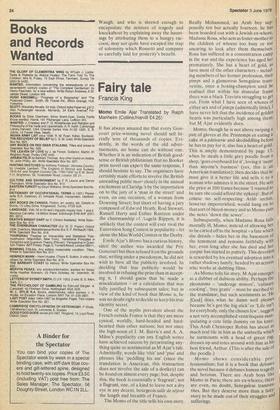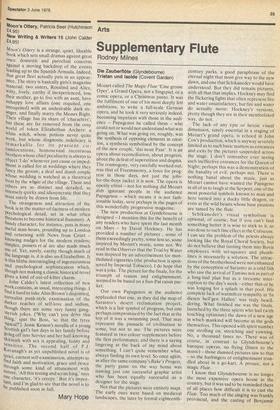Fairy tale
Francis King
Momo Emile Ajar Translated by Ralph Manheim (Collins/Harvill £4.25)
It has always amazed me that every Goncourt prize-winning novel should sell literally tens of thousands of copies. Evidently, in the words of the old advertisements, no home can do without one. Whether it is an indication of British goodsense or British philistinism that no Booker prize novel can expect the same response, I should hesitate to say. The organisers have certainly made efforts to involve the British unreading public mopclosely in the annual excitement at Claridgt's by the importation on to the jury of a 'man in the street' and even, on one occasion, of a woman from Downing Street; but short of having a jury composed of Edveird Heath, Rod Stewart, Russell Harty and Esther Rantzen under the chairmanship of Angela Rippon, it is unlikely that the contest will ever rival the Eurovision Song Contest in popularity — let alone the Miss World Contest or the Derby.
Emile Ajar's Momo has.a curious history, since the author was awarded the Priz Goncourt but then refused it on the grounds that, writing under a pseudonym, he did not wish to have all the publicity involved. In deciding that less publicity would be involved in refusing the prize than in accepting it, I should guess that he made, a miscalculation — or a calculation that was fully justified by subsequent sales; but in view of the kind of book that Momo is, he was no doubt right to decide to keep his true identity secret.
One of the myths prevalent about the French outside France is that they are more cynical, worldly, hard-headed and hardhearted than other nations; but not since the high-noon of J. M. Barrie's and A. A. Milne's popularity can any English writer have achieved success by perpetrating anything quite so sentimental as M Ajar's tale. Admittedly, words like 'shit' and 'piss' and
phrases like 'peddling his ass' (since the translation is American, this transaction
does not involve the sale of a donkey) can be found on almost every page; but, despite this, the book is essentially a 'fragrant', not
a flagrant, one, of a kind to leave not a dry eye in any decent, bourgeois salle de sejour the length and breadth of France.
The Momo of the title tells his own story.
Really Mohammed, an Arab boy supposedly ten but actually fourteen, he has been boarded out with a Jewish ex-whore, Madame Rosa, who acts as foster-mother to the children of whores too busy or too uncaring to look after them themselves. Rosa has suffered in a concentration camP in the war and the experience has aged her prematurely. She has a heart of gold, as have most of the other characters — including members of her former profession, their pimps. and a glamorous Senegalese transvestite, once a boxing-champion until he realised that within his muscular frame there was a black Traviata struggling to get out. From what I have seen of whores of either sex and of pimps (admittedly little), I have never felt that the incidence of golden hearts was particularly high among them; but M Ajar evidently does.
Momo, though he is not above swiping a pair, of gloves at the Printemps or eating a cake at a patisserie and skedaddling before he has to pay for it, also has a heart of gold. This is amply demonstrated by page 13, when he steals a little grey poodle from a shop, `goes overboard for it', loving it 'more than anyone's business' (yes, this is 411 American translation); then decides that he Must give it a better life and sells it to a woman who admires it in the street. He sets the price at 500 francs because 'I wanted to be sure she could afford the upkeep'. But of cobrse no self-respecting Arab urchin, however impoverished, would hang on to that sort of blood-money and so Momo puts the notes 'clown the sewer'.
Subsequently, when Madame Rosa falls mortally ill, Momo, instead of allowing her to be carted off to the hospital — a fate which she dreads — hides her in the basement of the 'tenement and remains faithfully with her, even long after she has died and her corpse has started to putrefy. This devotion is rewarded by his eventual adoption into a rather shadowy family, headed by an actress who works at dubbing films.
As Momo tells his story, M Ajar emerges as a dubber of dubious ability. Perhaps the
pleonasms — 'underage minors', 'culinary cooking', 'free gratis' — must be ascribed te the translator; but such sentiments as 'W [God] does what he damn well pleases I because he's got the big stick' or 'Life isn't I
for everybody, only the chosen few', suggest a not very accomplished ventriloquist man
ipulating a cute little dummy on his knee.
This Arab Christoper Robin has about as much real life in him as the umbrella which
he surmounts with a head of green rag, dresses up and totes around with him as his best friend, Arthur. (This is after the sale of
the poodle.) •
Momo shows considerable pro• fessionalism; but it is a book that debases the novel because it debases human tragedY and heroism. There are Arab boys like . Momo in Paris; there are ex-whores; there are even, no doubt, Senegalese transvestites. But they deserve more than a fairy' story to be made out of their struggles and sufferings.
Moon's Ottery, Patricia Beer (Hutchinson £4.95) New Writing & Writers 15 (John Calder £4.95)
Moon's Ottery is a strange, quiet, likeable book which sets small dramas against great ones: domestic and parochial concerns against a moving backdrop of the events leading up to the Spanish Armada. Indeed, that great fleet actually puts in an appearance. The story is basically girls's magazine Material: two sisters, Rosalind and Alice, Witty, lively, earthy if inexperienced, lose their mother, go to live with an aunt, have unhappy love affairs (one requited, one unrequited) with an undesirable dark stranger, and finally marry the Messrs Right. Their village has its share of 'characters'; but these are far removed from the cosy World of token Elizabethan Archers: a White witch, whose potions never quite Work, but whose diagnostic indelicacy is remarkatile for its prurient circumlocutions; homosexual incestuous brothers whose chief peculiarity is always to Object 'I do' whenever just cause or impediment is called for at weddings where they fancy the groom; a deaf and dumb couple Whose wedding is watched as a theatrical treat by the whple of the village. These and Others are so distinct and detailed, so Intensely quirky and idiosyncratic that they Must surely be drawn from life.
The strangeness and attraction of the book is in the matter-of-factness of modern Psychological detail, set in what often
threatens to become historical flummery. A handy character, for instance, puts in many useful man-hours, pounding up to London and returning with News from Court — knowing nudges for the modern readers; simples, possets eta! are also made much use of. Yet, surely, earthy though much of the language is, it is also un-Elizabethan. It Is this blithe intermingling of ingenuousness and psychological sophistication which, though not making a classic historical novel gives a kind of out-of-kilter charm.
John Calder's latest collection of new Work contains, as usual, interesting things. I find it hard to take Alan Brown's disjointed, surrealist punk-style examination of the darker reaches of self-love and sadism, though thcire are some very funny gangsterish jokes. ('Why can't you drive this thing,' spat the Boss, `so that the tyres Squeal?'). Jessie Kesson's novella of a young Scottish girl's last days in her family before going off into Service and her half-knowing Skirmish with sex is appealing, funny and sensitive. The second half of P.J. Kavanagh's as yet unpublished novel is of quiet', earnest self-examination, attempts to find faith and motivation, grace and peace through some kind of attunement with nature. 'All this testing and scratching,' says One character, 'it's creepy.' But it's important, and I'm glad to see that the novel is to ue Published soon in full.
Mary Hope



































 Previous page
Previous page